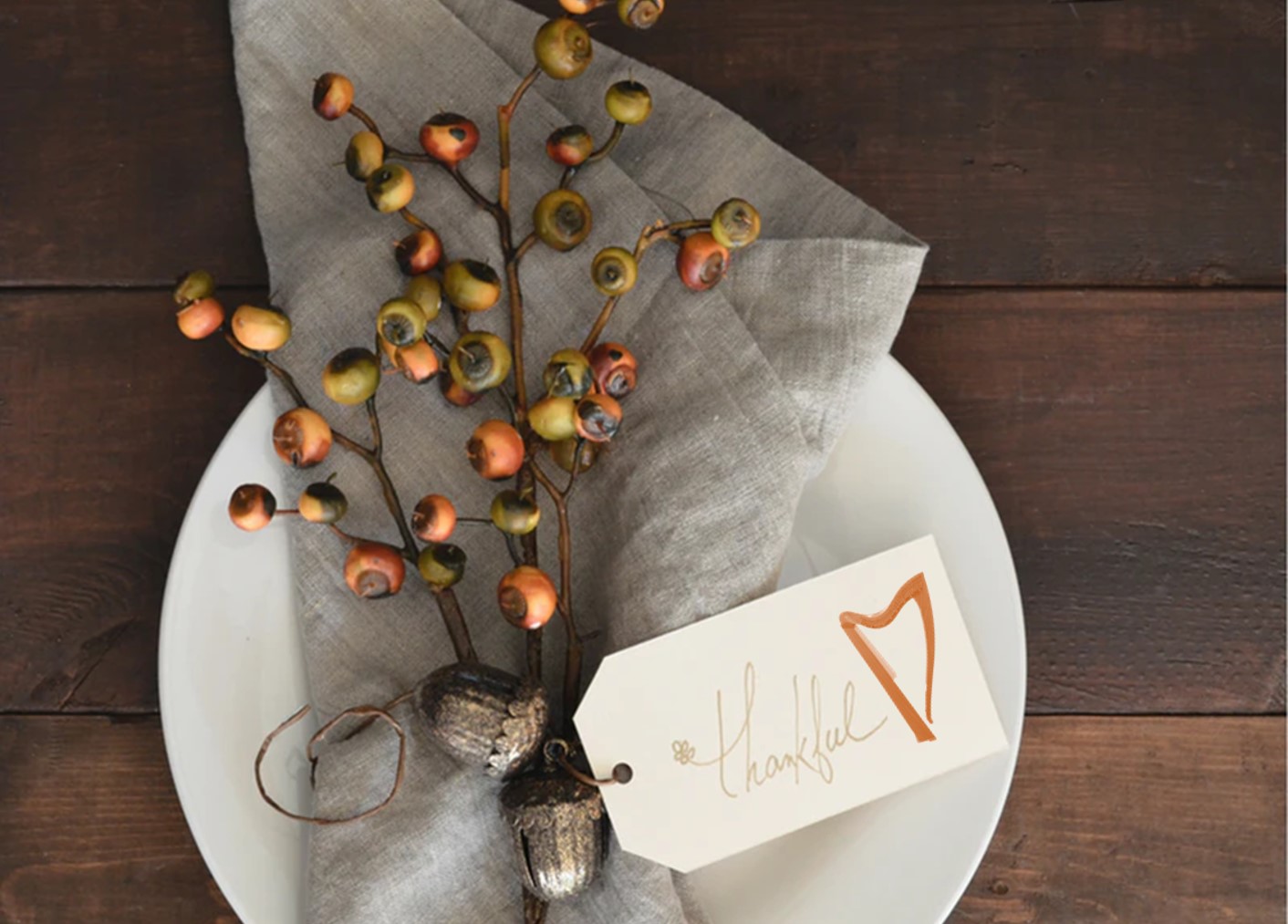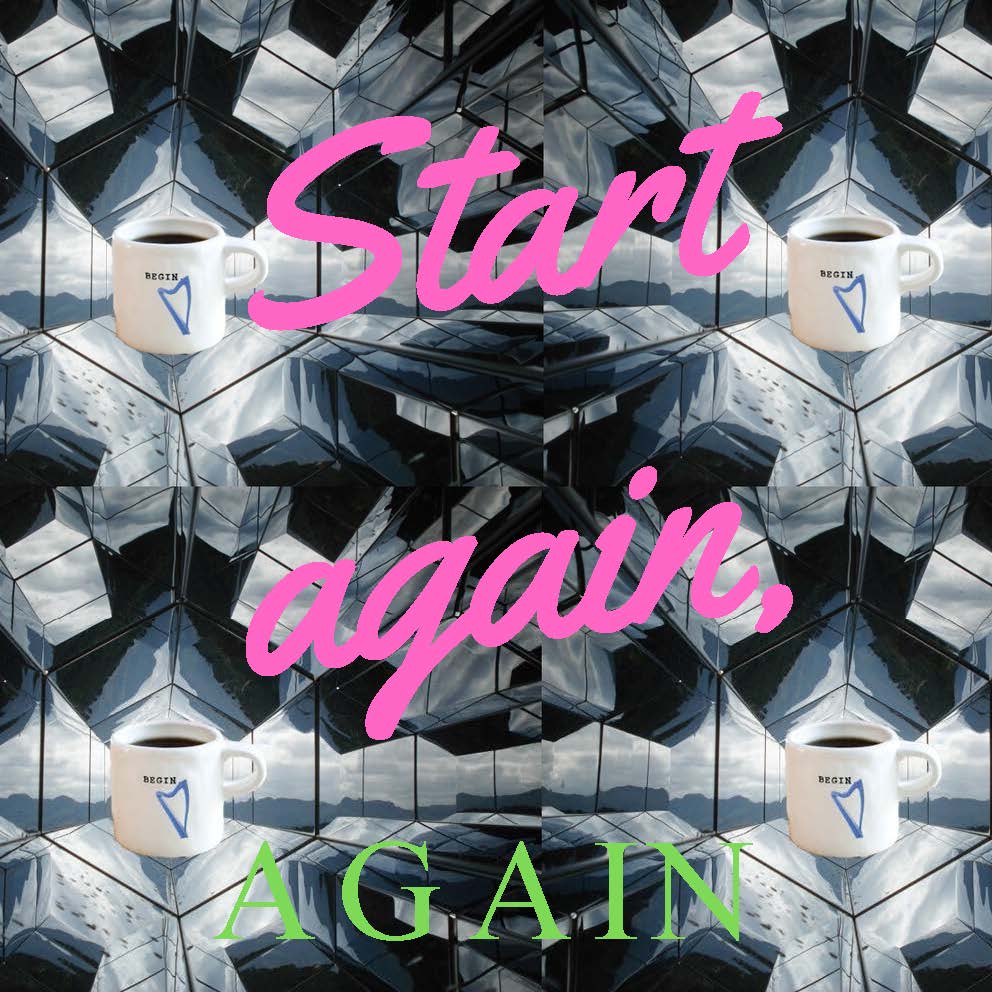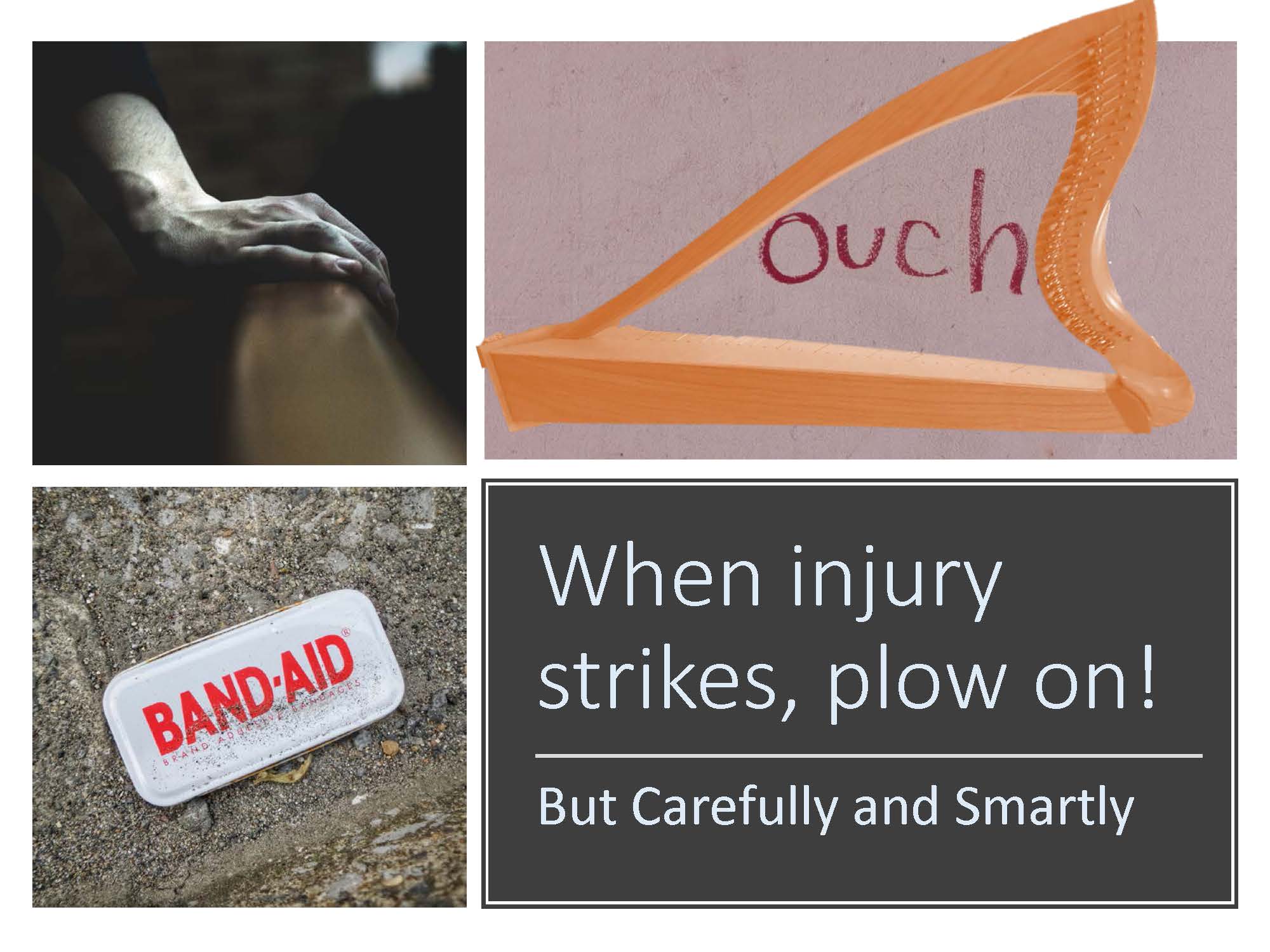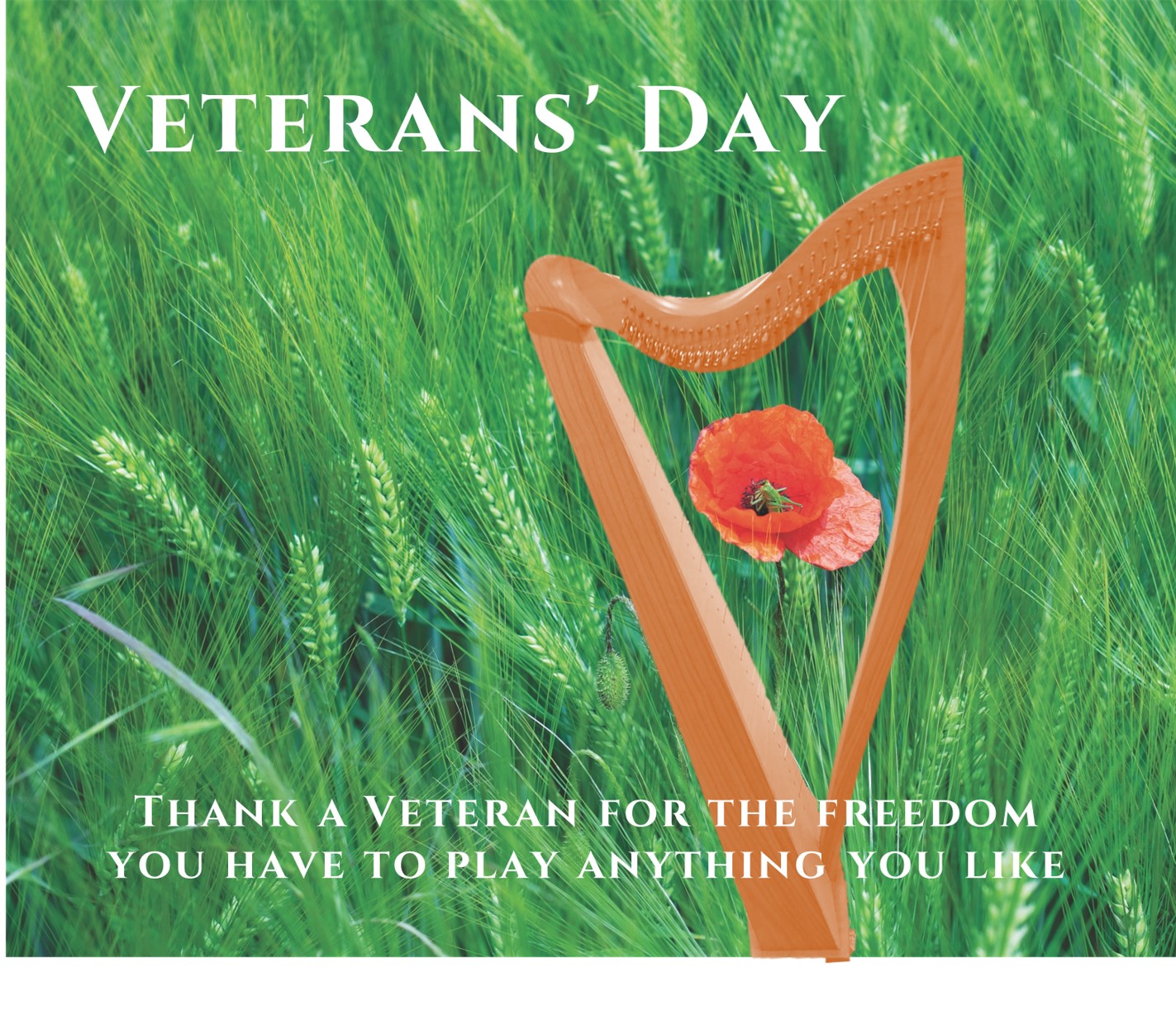Hoping you have much for which to be thankful. Thank you for reading and being part of my harp life. I am so grateful for your presence, your humor, your wit, and sometimes your patience!  Happy Thanksgiving!
Happy Thanksgiving!
Month: November 2019
-
Starting again, again
I’m on that high you get when you’ve had a great lesson where you’ve worked hard, learned a ton, enjoyed receiving information, knowledge and wisdom from a good teacher, had a genuinely good time, and are now exhausted!
Woohoo!!
What? you want to know why I would be taking a lesson?
That is an easy answer to give – because I needed to start again, again.
 There is so much to know and to learn. We all have some of the pieces, but none of us has all the pieces. However, I keep working on the puzzle, so I gathered more pieces from another source – and I think the picture in the puzzle is starting to take shape and be visible!
There is so much to know and to learn. We all have some of the pieces, but none of us has all the pieces. However, I keep working on the puzzle, so I gathered more pieces from another source – and I think the picture in the puzzle is starting to take shape and be visible!I have a beautiful Wurlitzer Starke. I am so fortunate and grateful to have it. But, to be honest, it has been collecting dust in the corner. Of course I play it – occasionally. But I didn’t play it enough. And I was making no movement toward the music I got it to work on – music I insisted I needed to play!
I have a confession to make. I don’t just like Scottish music. I love music. I particularly like Baroque, Classical, and Romantic music. I’m also a picky taster at the modern table. But it was hearing Faure’s Impromptu on the radio that compelled me to venture into the pool of the pedal harp.
Yes, I heard that piece and I was smitten! Just one teeny-tiny problem – I didn’t actually know how to start. Because, while yes, a harp is a harp, I was a little bit afraid of my pedal harp.
So, I needed to start again.
In that weird way the world works, just before all of this, separately, two of you mentioned needing to start over again – in the same week! So, I’ve had this idea of starting again, again in mind as I headed out to my lesson.
Do you need to start again, again? It’s not a bad idea, and here’s why:
- Beginner’s Mind. You might have heard this concept of keeping a “beginner’s mind” – holding curiosity forefront, being eager to learn, being grateful for each step forward no matter the size. And perhaps most importantly, the beginner’s mind has no expectations of performance – no disappointment on not getting something right the first try or impatience that it’s “taking too long” to learn something.
- No matter where you go, there you are (but you’ve worn down your shoes!) – you might want to start again again just to get a “tune-up”. I’m always amazed how quickly small bad habits can build (and band together!) – a little slump leads to a little neck craning leads to dragging your arm on the sound board and a one way ticket to poorer playing and possible injury.
- Someone out there knows something that could push you just a little farther along on your path. But if you don’t ask for the help and information, you might never get that little shove you need! And you never know who will have it or what it will look like, so you need to pay attention.
- No one wants to become stale. And it’s easy to do. It’s so much easier to play the same ten tunes forever, but it’s very motivating to have new repertoire the next time you see your harp buddies. Whether you have a lesson, go to a workshop, or find new music to learn, you’ll prevent yourself from becoming musty and have an opportunity to start again.
- Something worth having is worth fighting for. It is easy (as in the above) to become complacent, but you know you want to be as good as you can become, and while it might not be a “fight” per se (although that might depend on the tune!), working for something you want has it’s benefits while not working will have significant drawbacks (like being disappointed in yourself!).
Taking the perspective of starting again, again can be freeing. Of course, we’re not always in a place where we need to start again, again so if you’re not there that’s great! But if you find yourself thinking that starting over might be the best way to move forward, really step into it and begin again…again!
Have you found yourself in this place? How did you know? what did you do? Was it worth it? Let me know in the comments!
-
When injury strikes – plow on! (but carefully and smartly)
One of my students recently broke her arm*. Really broke, with surgery and plates and screws, and other barbaric medical necessities. It was not pretty. She needed time to heal, and I encouraged her to take the time to recover so healing would go faster and more successfully.
And with good care and physical therapy (and more patience that I would have shown), she’s been on the mend. I’m delighted to have her back at the harp (with clearance from the physician and the physical therapist).
But, she’s a trooper and while she was recovering, she didn’t lay on the couch and moan! Nope – she plowed on!
 Now, let me explain what I mean by “plowed on”. What she did not do is ignore the physical therapist or the physicians. She did not just sit around. So, what did she do? She did the work she could do – carefully and smartly.
Now, let me explain what I mean by “plowed on”. What she did not do is ignore the physical therapist or the physicians. She did not just sit around. So, what did she do? She did the work she could do – carefully and smartly.- She listened to music – because she knows this is a good way to perform mental practice. You may have heard the old saw, “if you can sing it, you can play it”. Listening to the tune helps you get the melody in your head, learning the patterns of the notes, the relationships of the phrases, so that you can anticipate what comes next – in your mind! So when she was healed up, she had a lot of the brain part of learning already done and she was ready to go on to the finger part.
- She did her physical therapy – She told the PT that she’s a musician so the therapy could be tailored to her needs. And she actually did the exercises her PT taught her – both during their sessions and as prescribed between those sessions. She knew that although the exercises were no fun, they were fun-damental to her recovering and being able to get back to playing sooner.
- She continued to play with the other hand. My students know that we will work to play the melody in both the right – and the left – hands. Sometimes we also ask the right hand to play the harmony. We do this both to exercise the left hand to make it more limber but also to make our brains more limber by switching the roles of the two hands. She was able to keep that up throughout her injury.
- She rearranged some tunes – when you can only play with one hand, you rethink your harmonization. This is an interesting exercise in inversions and it’s a good opportunity to think about the shape and structure of the tune. Earlier work on hand shapes also meant that she was comfortable building harmonies in one hand…and she knew these would help transition to two hands when the time was right.
- She thought before she played – asking so much from your hands really does mean that thinking first makes sense to save unnecessary movement and work. She analyzed the tune before playing to figure out how to accompany with harmony in just one hand.
- She thought after she played – gaining a new perspective from playing with one hand results in new possibilities to analyze your playing, the structure of your practice, and the outcomes.
- She rested – after all, your body needs time to recover so resting is certainly necessary for recovery. And practicing in a new way meant becoming more tired sooner.
- She was patient – she understood that this was a serious injury and that, not being a child, it would require time to heal and to knit back together.
Being injured is never fun and injuring yourself may impact your playing. But once it has happened, it is what it is – so take care of yourself while you heal – but don’t abandon your harp! At a minimum it might soothe your hurt to play what you can!
* like any good article, this is based on a fiction derived as a composite of students. But if you break an arm – I’d suggest you be smart – just like my composite student!
